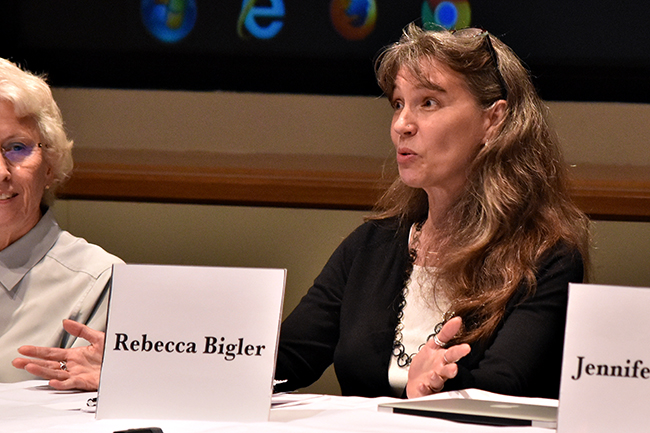Female representation and involvement in science, technology, engineering and math (STEM) fields can be improved by reducing stereotypes held by students and faculty in all levels of education, according to a panel featuring women in STEM during a discussion at the Avaya Auditorium on Wednesday.
Stereotyping occupations begins at the age of three because children recognize genders are not equally distributed among jobs, panelist Rebecca Bigler, psychology and women’s and gender studies professor, said.
“Girls begin to identify more with female dominated careers because young children make rigid classifications,” Bigler said. “As kids get to the age of 11 and 12, boys continue to endorse occupation stereotypes compared to girls. If girls believe they can do anything but boys don’t, they will face a wall.”
According to panelist Catherine Riegle-Crumb, curriculum and instruction in STEM education professor, young women do not have to believe in these stereotypes to be hurt by them.
“If people around you think that you are not capable, it has a negative impact on your sense of belonging,” Riegle-Crumb said.
Mathematics junior Victoria Dominguez said she has not experienced blatant stereotyping but has experienced micro-aggressions such as peers pointing out that she is a minority woman in the STEM field.
“It makes you hyper aware of yourself,” Dominguez said. “When you struggle at all, it weighs down on you a little more because you have all of these people implying that you aren’t supposed to be here.”
Tricia Berry, panelist and director of the Women in Engineering Program, said solutions to this problem lie in changing the way female students think about themselves.
“We need to expose girls to successful female role models,” Berry said. “If they believe they can learn and grow, they are less likely to be influenced by stereotype threat.”
Professors must realize the impact they have on their students and how a dismissive comment can convince someone they are in the wrong field, according to panelist Jennifer Glass.
“My high school physics class had three girls and thirty men,” Glass, a sociology professor, said. “The professor asked a question and was waiting for an answer, so I raised my hand and answered the question correctly because I was tired of waiting. The professor said, ‘Boys, are you going to let a woman beat you?’ and from then on I shied away from the hard sciences.”





















